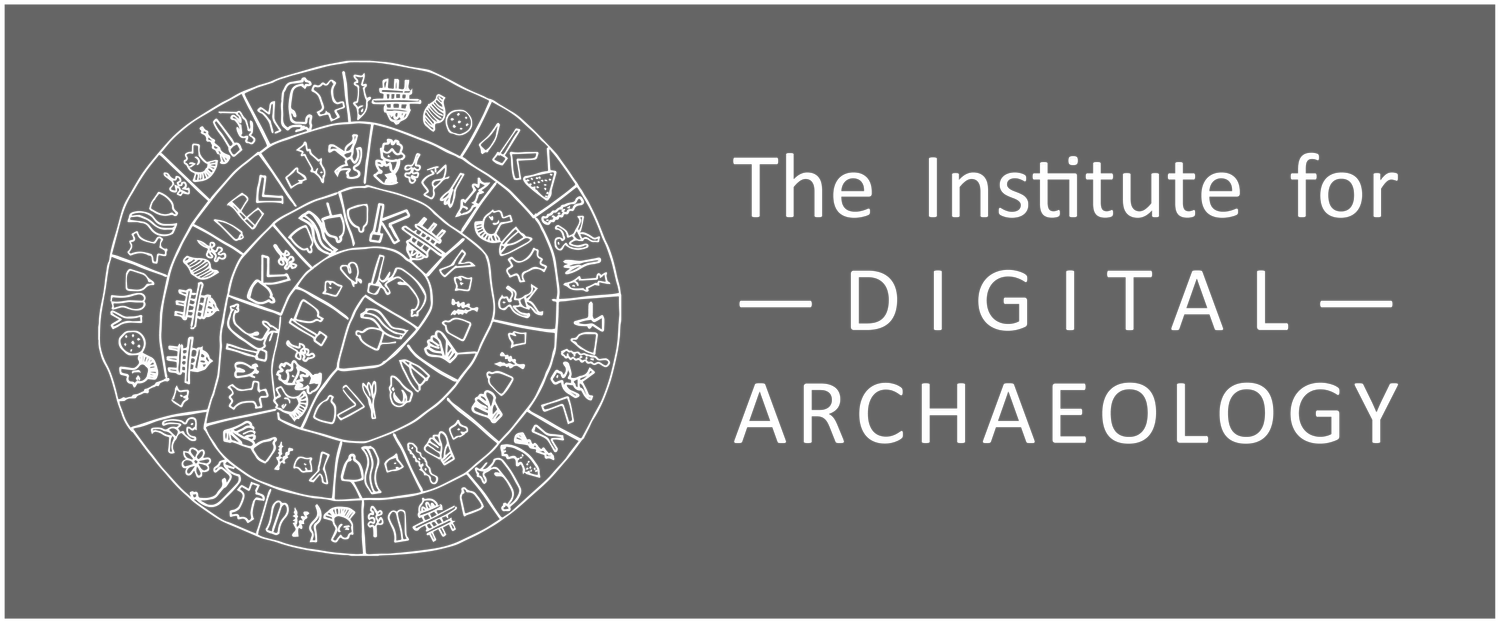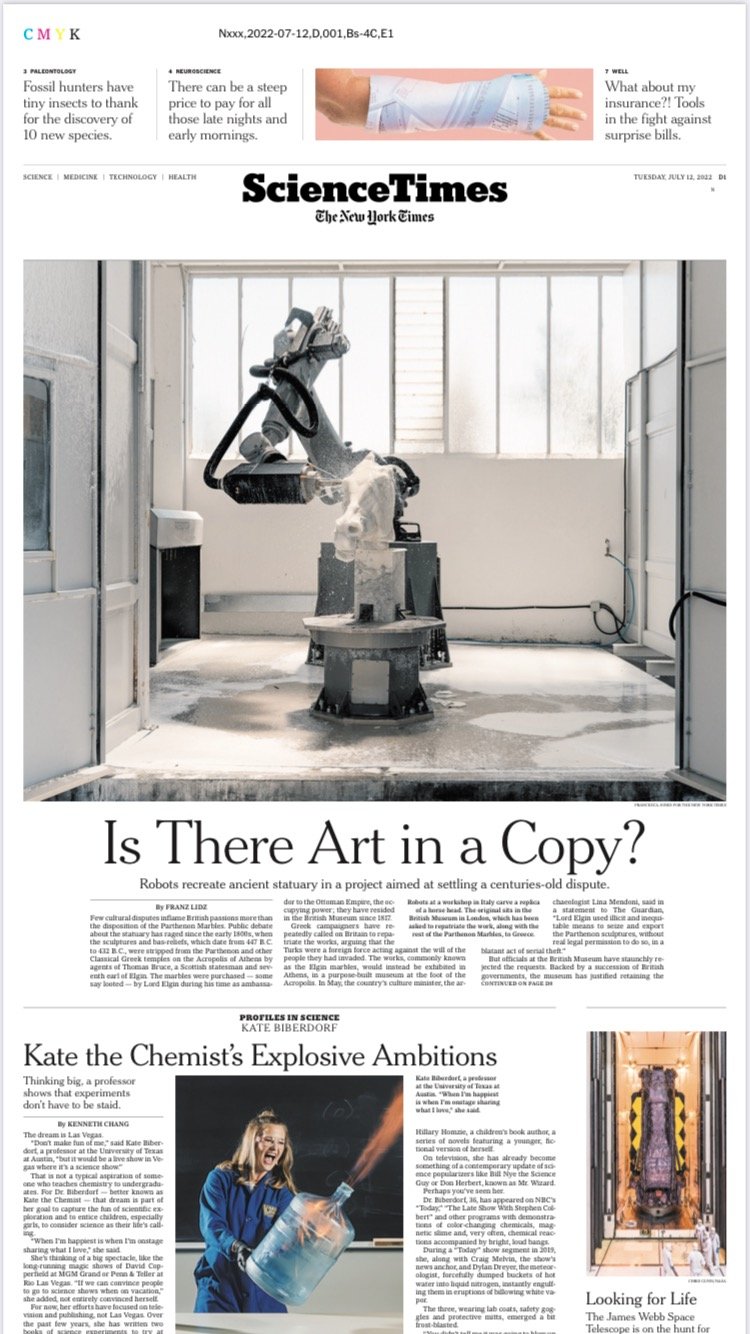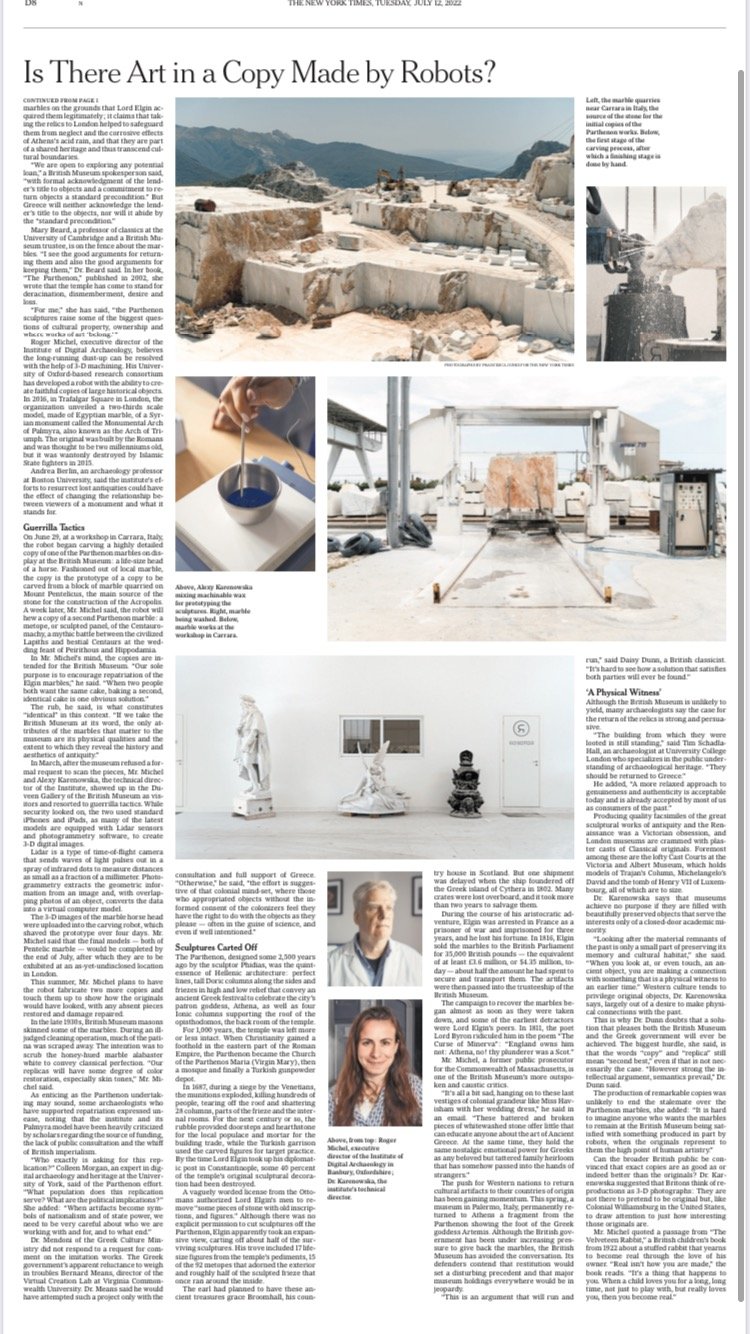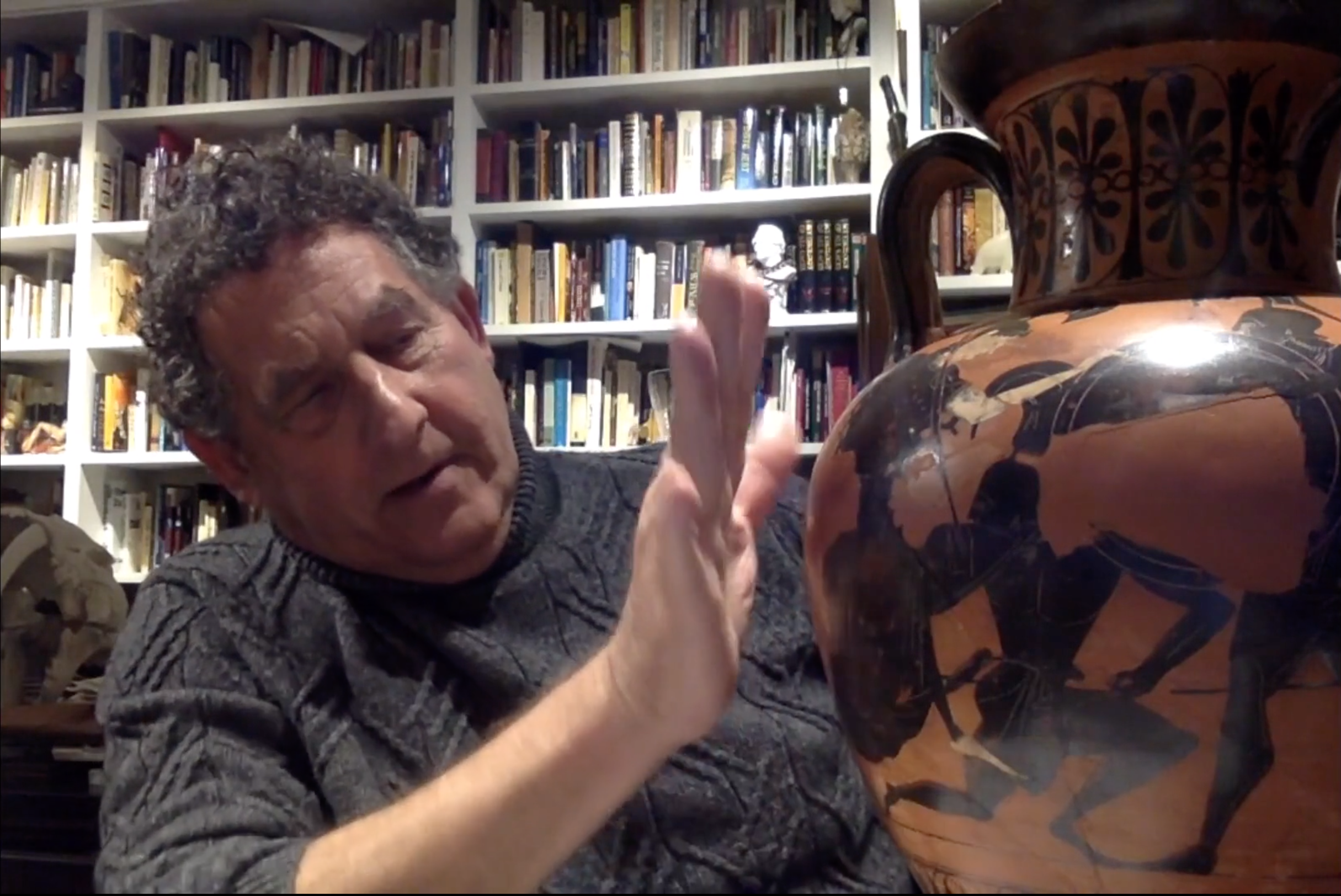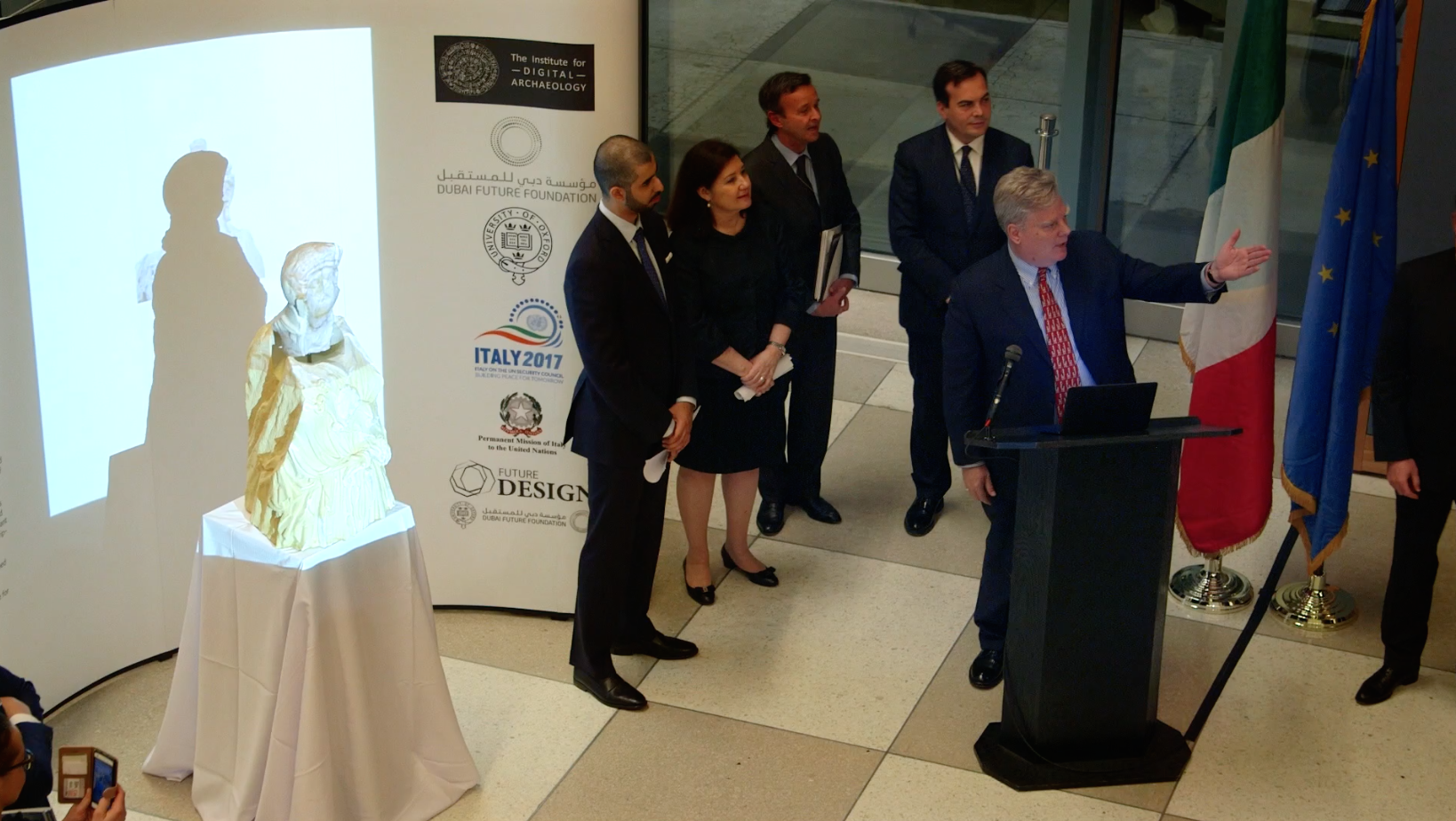Stuff the British Stole
The IDA's Roger Michel co-starred with actor and activist, Stephen Fry, in ABC's multi-award winning documentary, "Stuff the British Stole." Exploring Britain's fascination with and attachment to the material culture of other times and places, the film examines a range of interrelated themes, including authenticity, identity, erasure and animism. Watch a preview here.
TEDx Talk in Athens, Greece, October 5th 2024
On October 5, 2024 the IDA's Roger Michel opened the annual TEDx event in Athens with his talk, "Deus ex Machina: finding inspiration in iteration." Before a capacity crowd of 2000+, this live-steamed presentation explored the potential of technology—machina—to express humanity's compassion, creativity and aspiration—the deus that lives in each of us. View the talk here.
Coverage of the event can be found at Kathimerini and New Money.
Unveiling Portrait of Chief Justice Gants in Boston, Massachusetts
In a ceremony attended by more than 300 guests, including most of Massachusetts' living governors and chief justices, the IDA presented the Supreme Judicial Court with a portrait of the late Chief Justice Ralph Gants. At the event, the IDA's Roger Michel spoke of the crucial importance of physical avatars of cultural history alongside Massachusetts Governor Maura Healy & Chief Justice Kim Budd. Read about the event in the Boston Herald. You can view the ceremony here and here.
Byron Bicentenary in Missolonghi, Greece
Lord Byron is known globally as England's acclaimed Romantic poet. However, in Greece, he is also celebrated as a great hero of that country's war of independence. To mark the bicentenary of his death, the IDA commissioned a new Opera, "The Last Days of Byron," which we premiered for an SRO audience in his adoptive home-town of Missolonghi. The performance was part of a full day of commemorative events attended by Greek religious, military and political leaders, including Culture Minister, Lina Mendoni. Learn more from The Guardian, Aixmi News, Kathimerini, Sinidisi, and Agrinio 24.
Honoured to be featured in cover stories in both National Geographic and Smithsonian!
“In His Own Image” - An Exhibition Exploring the Art of the Copy at Oxford University
As Michelangelo said, “God creates, the rest of us copy." And we do it con gusto! Indeed, in this age of TikTok, Twitter and Instagram, nothing seems to matter unless it has been reposted millions of times. Along these lines, Aesop observed that "men are more inclined to applaud the imitation than the real thing," carrying as it does the comforting imprimatur of group endorsement.
To explore the phenomenology of the copy, the IDA mounted a joint exhibition with Magdalen College, Oxford comprising a huge range of copies — both faithful and fantastic. As you examine each object from the exhibition in our online gallery, consider where its message resides, and how the particular act of copying amplifies, mutes or transforms that message. See more here.
Our olfactory exhibits inspired by the spice trade of Ancient Ethiopia
will be featured at the Walters Museum in Baltimore, the Peabody-Essex Museum near Boston and the Toledo Museum. The Spice Road was a crucial conduit for religion, technology and literature from the Far East to East Africa. See articless in The Art Newspaper and The Walters Museum.
A New Record!
The IDA has created the world's smallest fine art reproduction—with features smaller than the smallest wavelengths of visible light. As a result, they are visible only under a scanning electron microscope.
As the Telegraph reported, one of these tiny horses was placed on "display" at the British Museum earlier this year with the hope that it would encourage visitors to consider the nontangible dimension of heritage objects.
This distillation of Phidias' genius was a major engineering achievement. Read more about it at Art Net.
The complete reversal in the British Museum's position on the Elgin Marbles since we announced our plans to create exact copies of the Parthenon sculptures on January 28, 2022 has been both miraculous and gratifying. The product of the tireless work of many people over many years, it will be a great day in Greece when the originals go back home where they belong. Many thanks to the global media for thoughtful, in-depth reporting that unquestionably moved the needle of public opinion and made this extraordinary diplomatic breakthrough possible. See here: The Washington Post, The New York Times, The Times, The Times Weekend Essay, The National News, and The Guardian, and listen to the IDA on the BBC!
Speaking alongside Greek ambassador HE Ioannis Raptakis at London’s Keats House, the IDA’s Roger Michel announced a new initiative aimed at resolving the longstanding dispute over the Parthenon Marbles: the creation of high-quality copies of the Marbles to replace those currently held by the British Museum, allowing the originals to be returned to Greece. The IDA’s proposal, subsequently endorsed in the editorial pages of the Times, calls for immediate construction of a “proof-of-concept” copy, carved in the original stone and accurate to sub-millimeter scale, of one of the Marbles in the BM’s collection. Copies like this will allow the BM to fulfill – indeed, significantly expand – its educational mission, while promoting ethical stewardship of important heritage objects. Read about the IDA’s plan here and here. See the Times editorial here. Read about the Greek reaction here, here, and here.
Roger Michel & Sir Simon Jenkins unveil the first of the IDA's Pentelic marble recreations
IDA's Roger Michel with Ambassador Raptakis at Keats House
The first of the IDA's Elgin reconstructions was unveiled at the Freud Museum in London to enthusiastic acclaim – both in the UK in Greece. The event was page 3 news in The Times and the cover story in the Greek national dailies. See Kathimerini, Ta Nea and EPT Times. It was also followed widely in the broader global press with the story of the unveiling covered by Euronews, ITV, ABC Cultura, ABC (Australia), Reuters, The National, Artnet, La Razón and many other news outlets. All of the coverage was enthusiastically positive.
Best of all, the head of the British Museum announced the day after the unveiling that "some of the BM's greatest objects could soon be seen again in the communities they originally came from." See the story here. An amicable resolution to the 200 year-old Elgin dispute—the IDA's goal from the outset—seems closer than ever!
The IDA is pleased to present a stage performance of UK Poet Laureate Simon Armitage’s new verse translation of the Owl and the Nightingale. Directed by Tony and Olivier award-winning director John Tiffany, this new adaptation of the classic Middle English “debate poem” will be performed at London’s Royal Court theater. Although the poem’s allegory is somewhat inscrutable, some critics see it as a conversation between church reformer Henry II and his one-time friend Thomas Becket. Regardless of the precise subject matter, the poem provides a fascinating window into the colorful and complex world of medieval Britain. Read about the project here.
The IDA hosted Times Chief Foreign Correspondent Christina Lamb, Channel 4 news anchor Krishnan Guru-Murthy, and author Maki Kimura at the University of Oxford for a panel discussion on the public controversy around questions of accountability and reparations in connection with Japan’s WWII ‘Comfort Women’ regime – a state-sponsored system of sexual enslavement that victimized hundreds of thousands of young women. The panelists were honored to be joined by 93 year-old activist and ‘Comfort Women’ survivor. Lee Yong-soo, who provided uniquely powerful witness to these tragic events. Read about the project here, here, here, and here.
As first revealed on Good Morning America, the IDA's ongoing search, in collaboration with Lord Charles Spencer, for the wreck of the White Ship took an extraordinary turn off the coast of Normandy. Using data provided by IDA Technical Director and Oxford University engineer and physicist Dr. Alexy Karenowska, our superb divers, Giles Richardson and Holger Schuhmann, located a significant wreck that corresponds to documented features of the White Ship. This was the culmination of months of work by the IDA technical staff. We will be returning the site in the next few weeks to verify our findings! Video credit: ITV/Samuel Courtney. To view the full program, Click Here. Read more in the Telegraph, Daily Mail and Hodinkee.
video from ITV/Samuel courtney
Featured on the BBC World Service and Euronews and in the Times, Guardian and Vanity Fair, the IDA has meticulously recreated the voice and visage of John Keats on the occasion of the bicentennial of his death. For more on the amazing art and science behind this project, Click Here.
For a great review of CGI Keats’ historic performance, see Anna Russell's superb piece in the New Yorker.
OTHER ACTIVITIES AND EVENTS
On Time and Timekeeping
The IDA’s new installation. “Heartbeat of the City: 500 Years of Personal Time,” at the University of Oxford’s History of Science Museum has been called “one of the most important exhibitions of time and timekeeping in recent years.” A collaboration between the IDA, Vacheron Constantin and Charles Frodsham & Co., “Heartbeat of the City” celebrates several significant anniversaries, including 500 years of Swiss watchmaking, the 250th birthday of the lever escapement (the beating heart inside most mechanical watches), and the 100th anniversary of Einstein’s Nobel Prize. Exhibits include dozens of rare watches with amazing stories to tell—from Napoleon VI’s Vacheron to the humble Hafis that crossed Antarctica with Sir Edmund Hilary’s sled-dog handler. The centerpiece of the exhibition is a monumental kinetic sculpture depicting one of the most cunning and useful mechanical devices ever produced: the Mudge escapement—the invention that made the wristwatch possible. Created by Oxford physicist and award-winning public art designer, Dr Alexy Karenowska, the eponymous “Heartbeat of the City” invites visitors to consider their personal relationships with time and how their own lives fill time with meaning. Read more about the exhibition here, and here, and in The Telegraph. And read what the Wall Street Journal had to say about the IDA's watch collection here.
Digital Syria
The Digital Syria initiative is dedicated to preserving the tangible and intangible cultural heritage of Syria and the Syrian people. Launched in 2019, Digital Syria combines online resources with international events, publications, and educational programming at the interface between science and culture.
إن مبادرة سوريا الرقمية مكرسة للتراث الثقافي السوري المادي وغير المادي وللشعب السوري ايضاَ. تم إطلاق Digital Syria في عام 2019 ، لتجمع بين الموارد عبر الإنترنت مع الأحداث الدولية والمنشورات والبرامج التعليمية.
This summer, we expanded the Digital Syria workshop program to include additional activities incorporating culturally embedded performance arts—especially storytelling and music. Hear Amal, one of our storytellers, tell her own story and listen to her reading of “The Peacock’s Tale” here.
Our oral history project brings together the personal reflections of Syrian people of all ages from across modern Syria as well as their retellings of the traditional stories of their region. Over the summer, many new stories have been collected and will soon appear online on our ORAL HISTORY PAGES. Check back soon for further updates!
Olfactory Heritage – The Odor of History
Heritage assets come in many forms. Some, like ancient edifices and colossal sculptures assert powerful physical presences. At the other end of the spectrum are purely ephemeral manifestations of culture—dance, cuisine, music—that are just as much connected to and molded by our collective past as any concrete building or marble statue, their transitory nature notwithstanding. As part of its efforts to record and preserve ephemeral culture, the IDA has launched an ambitious program to preserve the heritage of smells. The aim is to provide the technical means for documenting the aromas of today for the benefit of future generations – and to find new methods and opportunities for experiencing the odors of the past. The hope is that, someday, this will be a standard part of preserving the historical record, co-equal with other forms of heritage documentation. Read about the exhibition in The Times, The Telegraph, The Oxford Mail, and listen to an interview on talkRADIO.
Archaeology at Althorp
Since January 2021, the IDA has been excavating at Althorp, seat of the Spencer family for 500 years. Various settlements at the Althorp estate are well-documented in the Domesday Book and other early sources. Through the use of high-tech imaging gear, the IDA has located numerous underground areas of interest, and has unearthed significant archaeological evidence of Althorp’s early history. Much more work needs to be done to gain a full understanding of this complex site, occupied by many different cultures over a very great span of time. Read about surprising discoveries at the site here, here and here.
Maori Beowulf
The theater at Magdalen College, Oxford was the site of the European premier of a trilingual performance of the Maori Beowulf. Created with the assistance of Ataahua Papa and Seamus Heaney, this adaptation of the iconic Old English epic highlights the parallel development of two great seafaring cultures. The all-star cast included BBC legend John Simpson, former NZ High Commissioner George Fergusson, Oxford’s Rawlinson & Bosworth Professor of Anglo-Saxon Andy Orchard and Warner Music artist, Seana Davey. To watch this unique performance, Click Here. The production will travel next to New Zealand in 2022. Kia Ora!
Combatting War Crimes Denialism
In collaboration with a global coalition of scholars and activists, including UConn Professor Alexis Dudden, Phyliis Kim of CARE and renowned Korean photographer Ahn Sehong, the IDA is coordinating a series of activities to raise awareness of the sexual exploitation of women and children during WWII. Upcoming events include exhibitions, panel discussions, and an international film festival all focusing on the history of the so-called “Comfort Women” program during WWII—including recent efforts by extremists to rewrite that history. To read an interview with Ahn Sehong about the “Comfort Women” project, Click Here.
The IDA is coordinating a series of events to commemorate the 200th anniversary of the deaths of Percy Shelley and John Keats. To mark the occasion, the IDA will publish—in collaboration with UK Poet Laureate Simon Armitage—an anthology of new works honoring these icons of the Romantic age. In addition, the IDA has commissioned a special collection of fine art pottery inspired by contributors to this new anthology. These “Grecian urns for the 21st century,” including a pot from distinguished UK artist Dan Baldwin, will be auctioned for charity. Acclaimed poet and performance artist Scarlett Sabet will headline a series of public engagement events celebrating this important moment in England’s cultural history. Finally, through the magic of CGI, the IDA has resurrected Keats for a bicentennial reading of his last poem. Watch CGI Keats read “Bright Star” here. Read about the project in the Telegraph, Daily Mail UK, Oxford Mail, and The Guardian.
5 Minutes with the Past
Together with our government, museum, and educational partners, the IDA is developing a suite of virtual tools that will explore STEM topics through the lens of cultural history. Our first offering in this series, 5 Minutes with the Past, features a distinguished cast of classical scholars talking about the intersection of science and technology aided by an eclectic assortment of antique objects. Please view the episodes here.
Marconi Broadcast Van
In collaboration with the University of Oxford’s History of Science Museum (home of the Marconi archive) and Department of Physics, the IDA will present a new travelling exhibition celebrating the past, present, and future of microwave physics. Housed inside a refurbished and specially refitted vintage Morris van, the touring public exhibition will feature a wide range of resources, virtual and actual, to bring Oxford’s contribution to the microwave revolution to life. Among other things, visitors—including especially young people—will have the opportunity to explore the facilities of Marconi’s boyhood laboratory, consider the basic science underlying his life-changing invention of wireless communication technologies, and make digital and/or analog broadcasts of their own.
The Oxfordshire Kindness Wave
The IDA is very proud to partner with Oxford’s History of Science Museum and the Oxfordshire Kindness Wave to develop and host a series of events in connection with the Creative Challenge Initiative—a project-based learning program aimed at developing critical STEM skills. The first event in this series—the Tower Challenge—presented primary school participants with a difficult engineering puzzle: how to build a freestanding structure, taller than themselves, using only recycled materials. Finalists offered a creative and diverse array of impressive solutions!
Aerial Survey of Heritage Sites
The IDA, in cooperation with regional NGOs, will carry out aerial surveys of key archaeological sites in Northern Syria for the purpose of assessing the impact of climate change on historic structures.This is intended as an initial test of equipment and techniques in preparation for a more comprehensive survey program that ultimately will combine remote sensing with real time imaging.
Sutton Hoo Ship Reconstruction
The IDA has formed a partnership with the Sutton Hoo Ship’s Company to bring England’s Saxon history back to life. Significant progress has been made over the past year! Wood has been sourced for the keel and planking, the strongback is complete, a 20% model has been constructed to confirm our 3D model, and a 12-foot full scale section has been completed. All of the work is being carried out using traditional tools and techniques by a team of skilled shipwrights with support from scores of dedicated volunteers. In the lab, the IDA has undertaken an extensive research project into medieval iron-forging methods. Much has been learned about the surviving fittings of the Sutton Hoo ship—all of which will be applied to the creation of new fittings for our reconstruction at a traditional bog iron forge. The ship is taking shape! Read about this extraordinary project in The Times, the East Anglian Daily Times, The Sutton Hoo Ship’s Company, and The Telegraph.
The IDA Celebrates UNESCO Milestones in Switzerland
In partnership with UNESCO and the Swiss National Commission, the IDA’s Palmyra arch reconstruction was installed at multiple locations in Switzerland during 2019 to celebrate two important occasions. From April 12-27, the arch was on display outside the UN headquarters in Place des Nations in Geneva to mark the 20th anniversary of the 2nd Protocol of the Hague Convention. See videos for the event from RTS and Léman Bleu. Then, from June 13-24, the arch stood in Bern’s historic Casinoplatz to celebrate the Swiss Commission’s 70th anniversary. Read about the event in Le Matin and Basellandschaftliche Zeitung.
The IDA Library
The IDA maintains a collection of rare books, maps and paper ephemera relating primarily to the history and heritage of the Middle East and North Africa and to the history of the book and book arts. In addition, the IDA supports public exhibitions of these materials and regularly publishes catalogs – electronic and printed – of its own holdings as well as other important collections.
The Arch in Washington D.C.
House Foreign Affairs Committee Chairman Ed Royce (R-CA) and Ranking Member Eliot Engel (D-NY), both longtime advocates for the protection of global cultural heritage, jointly unveiled the IDA's reconstruction of Palmyra’s Triumphal Arch on the National Mall. As Mr Engel said during the 45 minute ceremony in front of the US Capitol: “When you look at this beautiful Arch, we are seeing through the eyes of ancient civilizations, and to have it right here, set against the classical columns of the Capitol, is really extraordinary.” Many thanks to Congressmen Royce and Engel for a memorable day.
IDA’s Arch at the V&A
London's Victoria & Albert Museum has acquired a scale replica of the IDA's reconstruction of Palmyra's Triumphal Arch. The replica arch will be on permanent display in the V&A's famous Cast Court alongside significant historical reconstructions dating back to the mid-19th century. Read about the installation in The Financial Times, The Guardian, The Telegraph and The Art Newspaper. Watch a video of the event HERE.
Arachnodrone
In collaboration with the University of Oxford’s Department of Physics and Trinity College, Oxford, the IDA is pleased to support a month-long residency by Emmy-award winning composer Dr Evan Ziporyn and his colleague, distinguished American composer Christine Southworth. Both Ziporyn, Kenan Sahin Distinguished Professor at the Massachusetts Institute of Technology, and Director of MIT’s Center for Art, Science and Technology, and Southworth, will be Artists in Residence at Trinity this winter. In addition to teaching master classes, conducting live webinars and performing original works, Ziporyn and Southworth will present a series of performances of their Arachnodrone—a sonification of the intricate patterns of spiders’ webs. Arachnodrone explores the engineering complexity of these extraordinary natural structures through a unique 1700-string interactive virtual instrument. The residency is aimed at exploring the potential of sonic interfaces for interacting with such structures. Learn more about the residency from Trinity College, University of Oxford Physics Department, and watch the full concern here!
The United Nations Hosts IDA Reconstructions
The IDA was honored to have its reconstruction efforts recognized by the United Nations. On November 21, 2017, the IDA unveiled its reconstruction of the The Lion of Al-lāt at the UN’s headquarters in NYC. Produced in collaboration with the Italian Permanent Mission and the Dubai Future Foundation, the month-long exhibition was installed in the foyer of the General Assembly Hall. Speakers at the unveiling included the President of the UN Security Council, the President of the UN General Assembly, the Deputy Secretary General of the UN and the UAE’s HE Omar bin Sultan. Then, on August 6, 2018, in collaboration with the UK Permanent Mission, the IDA presented a multimedia exhibition, again at UN Headquarters in NYC, entitled “Old Cities, New Eyes,” featuring a VR experience of historic London and some of the oldest known photographs of Palmyra. Watch a video of the 2017 event HERE, the 2018 event HERE, and watch a 2021 discussion forum HERE.
"The documentation of cultural heritage in areas affected by conflict or natural disasters, including through the use of new digital technologies, is a critical step to preserve the memory of our past and mitigate the risk of possible damage or loss of precious cultural assets. Initiatives such as the Million Image Database project by the Institute for Digital Archaeology, which is based on the support of numerous volunteers on the ground, also testify to the importance attributed to their cultural heritage by local communities."
Francesco Bandarin, Assistant Director-General for Culture, UNESCO
"Recently, the safeguarding, protection, and appreciation of the remains of the past has gained a powerful tool: the possibility of immersive visualization and 3D reconstruction of archaeological sites and finds. We are glad and thankful to explore this technology with the Institute for Digital Archaeology (IDA), an organization that promotes the use of digital imaging and 3D printing in archaeology and conservation. The IDA’s Arch of Triumph of Palmyra serves as a model for how, together, we will bring life back to Palmyra and restore the site as a message of peace against terrorism, and will further collaborate in this way on other heritage sites in Syria."
Prof. Dr. Maamoun Abdulkarim, Director-General of Antiquities and Museums (DGAM), Syria
"There has been a great deal of conflict in our region and many monuments and artifacts representing the achievements of golden eras in our past have been lost as a consequence. Many have been intentionally destroyed in an effort to erase the memory of a time when people of all faiths and origins worked together to create a golden age of scientific, cultural and social achievements. However, new technologies can literally roll back the clock and restore what the nihilists have damaged. It is a message to them: everything they are working to erase can be preserved. Their destruction is as futile as their ideology. We are delighted to be able to bring together so many people from around the world to collaborate on this important project of historical restoration and preservation."
- His Excellency Mohammed Abdullah Al Gergawi, Minister of Cabinet Affairs and The Future, Dubai UAE & Managing Director of the Dubai Future Foundation
WHAT WE DO
Digital archaeology represents the natural evolution of classical archaeology, permitting researchers to look at ancient objects in entirely new ways -- to uncover hidden inscriptions, invisible paint lines, the faintest palimpsests -- and to share these discoveries with the world. Beyond that, digital technologies can put these crucially important repositories of our cultural identity and shared history forever beyond the reach of those who would destroy them. The Institute for Digital Archaeology (IDA) was founded to promote, improve and expand these important new digital tools.
Consistent with this mission, the IDA, through projects like the Million Image Database, has created accessible digital archives that encourage interdisciplinary collaboration and the crowd-sourcing of research through partnerships with institutions across the globe.
In addition, through stakeholder-led initiatives like our Triumphal Arch project, we have demonstrated our capacity to provide high quality and meaningful reconstructions of objects and architecture lost to vandalism or natural disaster.
The IDA stands at the forefront of the development and use of digital imaging, 3D printing and robotic carving techniques for the cataloguing, conservation and reconstruction of treasured heritage materials. By expanding our programs to include more sites, additional technologies, and a greater range of local, national and international partners, the IDA aims to retain its status as a global leader in the field of cultural heritage preservation.
The Institute for Digital Archaeology
Email: alexy@digitalarchaeology.org.uk
Contact Form
